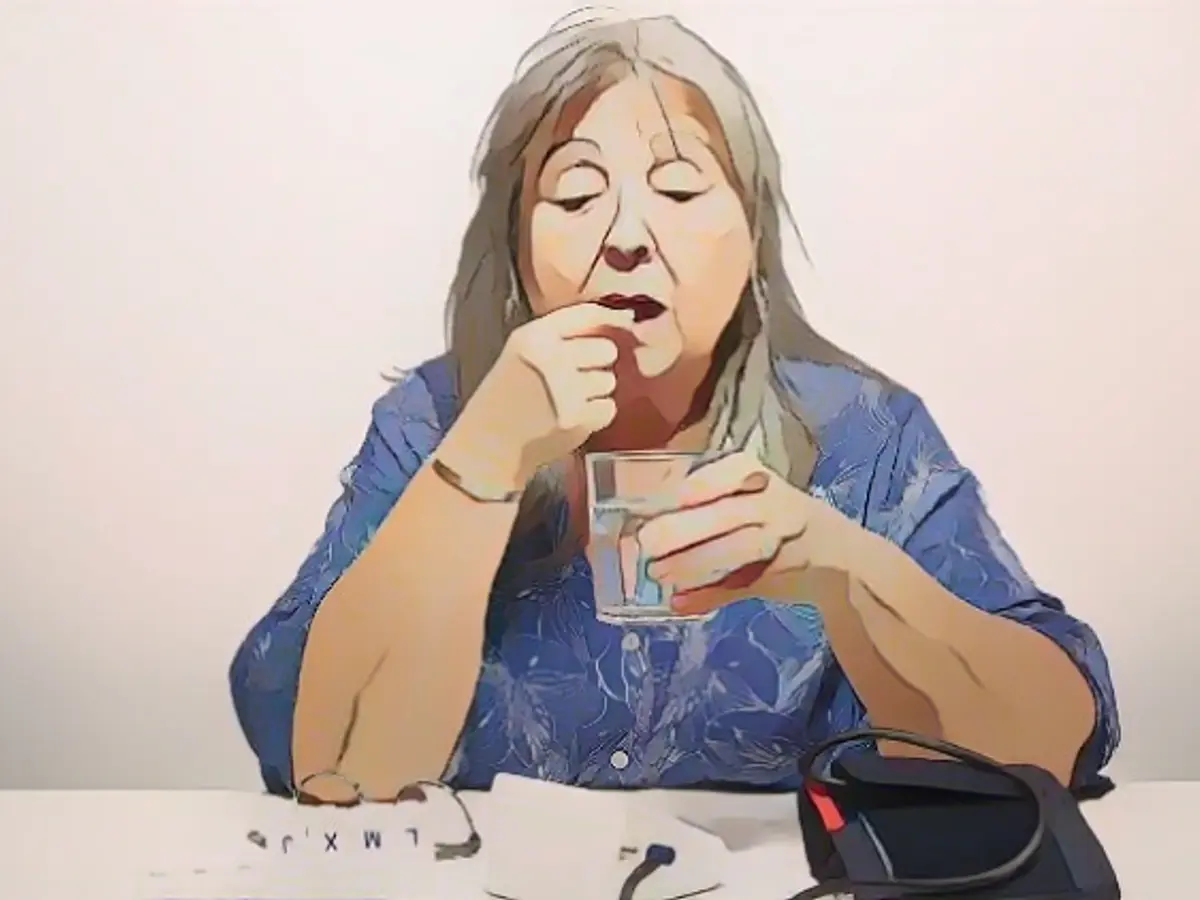How well which antihypertensive works
High blood pressure can be treated with different medications. A large-scale study is investigating how well three different substance classes work. Data from more than 32,000 people over a period of more than 20 years is being used.
According to an analysis, three important classes of antihypertensive drugs are essentially equivalent in the long term. This is the result of an analysis in which some patients were followed up for more than 23 years after the start of a clinical trial. Three groups of patients in the original study had received either chlorthalidone, a thiazide-type diuretic, the calcium channel blocker amlodipine or lisinopril, an angiotensin-converting enzyme (ACE) inhibitor.
"In this secondary analysis of a randomized clinical trial in an adult population with risk factors for hypertension and coronary heart disease, the mortality rate from cardiovascular disease was similar in all three groups," explains the team led by Jose-Miguel Yamal from the University of Texas Health Science Center in Houston (USA) in the journal "JAMA".
The current study is based on the ALLHAT study, one of the largest studies on the treatment of high blood pressure. Between February 1994 and March 2002, more than 42,000 patients at 623 medical centers in the USA and Canada were randomly assigned to a group that was treated with a specific medication.
The subjects were at least 55 years old at the time, had slightly or moderately elevated blood pressure and at least one other cardiovascular risk factor, such as heart attack, diabetes and others. The last follow-up examination took place after an average of 4.9 years. A large amount of data was collected from the patients in order to take into account differences in gender, age, ethnicity, previous illnesses, cholesterol levels and other characteristics.
Different active ingredients, different effects
The drugs investigated in the ALLHAT study work in different ways. A diuretic such as chlorthalidone stimulates the kidneys to excrete more salt, whereupon they remove water from the body; the blood volume is reduced and blood pressure falls. A calcium channel blocker such as amlodipine prevents the muscles in the blood vessel wall from contracting, which typically happens very early in hypertension; the larger vessel diameter causes the blood pressure to fall. The protein angiotensin II also constricts the blood vessels, which is prevented by an ACE inhibitor such as lisinopril.
Yamal and colleagues drew on the data from the ALLHAT study. They followed the participants in the study until the end of 2017 using medical records from the American Medicare health service. As around 80 percent of the patients had already died, they obtained the death certificates in many cases in order to determine the cause of death. In this way, they were able to extend the follow-up of 32,804 test subjects from the ALLHAT study to more than 23 years in some cases.
The mortality rate due to cardiovascular disease 23 years after randomization was 23.7 percent in the group treated with the diuretic chlortalidone. It was 21.6 percent in the calcium channel blocker group (amlodipine) and 23.8 percent in the ACE inhibitor group (lisinopril). The differences between the values are minimal and could also be due to chance. There were no noticeable differences with regard to gender, ethnicity and numerous other characteristics recorded. In addition, there was no evidence that any of the drugs increased the risk of cancer.
No medication is superior to another
"The interesting thing about the analysis is the very long follow-up period," says Markus van der Giet from the Charité in Berlin, President of the German Hypertension League. The study shows that none of the medication types is superior to the other and that there are no unexpected risks with a particular active ingredient after many years. "Basically, the result is a plea for early and careful control of blood pressure," emphasizes van der Giet.
For Ralf Dechend, researcher at Charité and the Max Dellbrück Center Berlin and senior physician at Helios Klinikum Berlin-Buch, the results of the study offer the possibility of personalized medicine. "If the active ingredients are equivalent, then the patient can be prescribed the medication that best matches their pre-existing conditions or that they can best tolerate," explains Dechend.
Roland Schmieder, senior physician at Erlangen University Hospital, adds that an ACE inhibitor or beta blocker is usually administered for heart failure, for example, because it also helps against this condition. A calcium channel blocker, on the other hand, would be counterproductive in heart failure. A diuretic should be avoided in the case of diabetes.
Changing medication instead of increasing the dose
A study presented in "JAMA" in April showed that high blood pressure patients may experience far greater improvements by changing their medication than by taking a higher dose. The effect of common drugs of different classes - thiazide diuretics, ACE inhibitors, angiotensin II antagonists and calcium antagonists - varied greatly from person to person, with certain patients achieving lower blood pressure with one drug than with another. In addition, a change of medication had a greater effect for many test subjects than doubling the dose of the current medication, reported a team led by Johan Sundström from Uppsala University (Sweden).
One conspicuous feature of the results currently presented, which Yamal and his colleagues themselves immediately mitigate, is a 19 percent increased risk of stroke in the lisinopril group compared to the chlortalidone group. "After taking several comparisons into account, this increased risk was no longer significant," write the study authors. Schmieder nevertheless criticizes the fact that this result is highlighted in the article. This is because there is no serious scientific evidence that ACE inhibitors increase the risk of stroke. The decisive factor is the reduction in blood pressure.
Schmieder, one of the authors of the national care guideline "Hypertension" (high blood pressure) and the current European guidelines "Hypertension 2023", criticizes the "JAMA" study for the fact that the follow-up was only carried out on the basis of medical records. "It is not known what medication the patients took after the end of the original study, how they lived, what their blood pressure was and there is hardly any other information about the follow-up phase," Schmieder emphasizes. For this reason, statements such as those on ACE inhibitors could be misleading.
The earlier, the better
The ALLHAT study did not examine the lifestyle of the patients. Van der Giet, Dechend and Schmieder emphasize the importance of a healthy diet, quitting smoking and sufficient exercise for the level of blood pressure. "Lifestyle is similar to drug treatment: the earlier the lifestyle change takes place and the sooner blood pressure is sensibly adjusted, the better," summarizes van der Giet. Schmieder reports that losing five kilograms of weight lowers systolic blood pressure by an average of ten millimetres of mercury.
What is new is the finding that not only dynamic sports, but also isometric sports, such as tension training in the fitness center, can lower blood pressure, says Schmieder. However, Dechend warns against relying solely on sport and a change in diet to lower blood pressure and avoiding medication. A well-controlled blood pressure is crucial.
Reducing salt consumption
Only recently, a study, also published in "JAMA", showed that a sharp reduction in salt consumption had a blood pressure-lowering effect in three quarters of the 213 participants aged between 50 and 75 after just one week. This even applied to patients who were already taking antihypertensive medication. The effect was also independent of age, gender, ethnic group, body mass index and diabetes. The study was conducted by a group led by Norrina Allen from Northwestern University in Chicago (USA).
According to a report presented by the World Health Organization (WHO) in September, high blood pressure is a "silent killer" because four out of five sufferers are not treated properly. With better education, diagnosis and treatment, the WHO estimates that 76 million lives could be saved worldwide by 2050. In addition, 120 million strokes and 79 million heart attacks could be prevented.
One in three adults worldwide is affected by high blood pressure, it said. It can lead to strokes, heart attacks, heart and kidney failure and many other diseases. According to the WHO definition, a blood pressure of more than 140 over 90 is considered high. Risk factors include eating very salty food, little physical activity and too much alcohol.
Read also:
- This will change in December
- German activists speak out in Dubai on suffering in Israel and the Gaza Strip
- Nuclear fusion - hype or solution to energy problems?
- Budget crisis fuels debate on citizen's income - Bas warns against populism
The findings from a secondary analysis of the ALLHAT study suggest that chlorthalidone, a thiazide-type diuretic, and other classes of antihypertensive drugs, such as calcium channel blockers and ACE inhibitors, have similar longevity in managing high blood pressure and reducing the risk of cardiovascular disease-related mortality. Education about the importance of lifestyle changes, including a healthy diet, quitting smoking, and regular exercise, should be emphasized to complement medication in managing high blood pressure.
The current study also highlights that different medications for high blood pressure may vary in effectiveness for individual patients, with some achieving better results with one drug than another. This underscores the importance of personalizing medication choices based on patient tolerability and existing conditions.
Source: www.ntv.de







